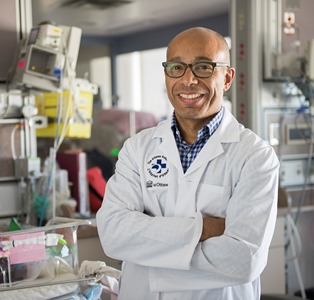Newsroom
Rejuvenating damaged newborn mouse lungs with stem cells
février 14, 2018

Dr. Bernard Thébaud and his team have shown for the first time that differentiated human stem cells can prevent lung damage in lab models of bronchopulmonary dysplasia. BPD is a chronic condition caused by the breathing equipment that keeps premature babies alive. Usually when the lungs are injured, cells called AEC2s located in the deep lung multiply and help repair the damage. However, BPD keeps these cells from multiplying and damages their DNA. To fix this, Dr. Thebaud’s team generated AEC2s from genetically reprogrammed human cells called induced pluripotent stem cells (iPSCs) and injected them to lab models before lung injury could start. This treatment was able to prevent BPD in these lab models. The human AEC2 cells were also safe and did not travel to other organs or form tumours, which often happens when iPSCs are directly injected. These results published in Cytotherapy show that this strategy holds promise for lung diseases in which the local repair cells are injured.
Authors: Mehdi Shafa, Lavinia Iuliana Ionescu, Arul Vadivel, Jennifer J.P. Collins, Liqun Xu, Shumei Zhong, Martin Kang, Geneviève De Caen, Manijeh Daneshmand, Jenny Shi, Katherine Z. Fu, Andrew Qi, Ying Wang, James Ellis, William L. Stanford & Bernard Thébaud.
Funding: This research was possible because of generous donations to The Ottawa Hospital for Regenerative Medicine. The researchers have also received support from the Canadian Thoracic Society, Canadian Institutes of Health Research, and the Stem Cell Network.
The Ottawa Hospital: Inspired by research. Driven by compassion
The Ottawa Hospital is one of Canada’s largest learning and research hospitals with over 1,100 beds, approximately 12,000 staff and an annual budget of over $1.2 billion. Our focus on research and learning helps us develop new and innovative ways to treat patients and improve care. As a multi-campus hospital, affiliated with the University of Ottawa, we deliver specialized care to the Eastern Ontario region, but our techniques and research discoveries are adopted around the world. We engage the community at all levels to support our vision for better patient care. See www.ohri.ca for more information about research at The Ottawa Hospital.
University of Ottawa: —A crossroads of cultures and ideas
The University of Ottawa is home to over 50,000 students, faculty and staff, who live, work and study in both French and English. Our campus is a crossroads of cultures and ideas, where bold minds come together to inspire game-changing ideas. We are one of Canada’s top 10 research universities—our professors and researchers explore new approaches to today’s challenges. One of a handful of Canadian universities ranked among the top 200 in the world, we attract exceptional thinkers and welcome diverse perspectives from across the globe. www.uottawa.ca
Media Contact
Amelia Buchanan
Senior Communication Specialist
Ottawa Hospital Research Institute
Office: 613-798-5555 x 73687
Cell: 613-297-8315
ambuchanan@ohri.ca
